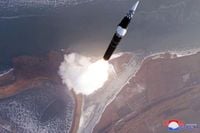On May 8, 2025, North Korea fired a volley of short-range ballistic missiles into the East Sea, marking a significant escalation in its military activities. South Korea's Joint Chiefs of Staff (JCS) reported that the missiles were launched from the eastern port city of Wonsan between 8:10 a.m. and 9:20 a.m. local time. The missiles traveled up to 800 kilometers (497 miles) before splashing down in the sea, with fewer than ten missiles being detected during the test.
This missile launch is particularly notable as it is North Korea's first since March 10, when it conducted a series of short-range missile tests. The recent activity has raised concerns among South Korean and international military analysts, who are closely monitoring North Korea's missile program. According to JCS spokesperson Lee Sung Joon, they are investigating the possibility that these tests could be linked to North Korea’s arms exports to Russia, especially as both countries have been deepening their military cooperation amid the ongoing conflict in Ukraine.
Lee explained that the missile tests likely involved systems modeled after Russia's Iskander missile, which is known for its precision and short-range capabilities. Furthermore, the tests included large-caliber rocket artillery systems that blur the line between traditional artillery and ballistic systems due to their self-propulsion and guided flight capabilities.
In the wake of these missile launches, North Korean state media reported that Kim Jong Un has urged munition workers to ramp up the production of artillery shells. This directive comes as North Korea and Russia confirmed for the first time that North Korean military troops have been deployed to support Russian forces in Ukraine. Pyongyang has claimed that its soldiers assisted in the "complete liberation" of the Kursk border region, a statement that was echoed by Russian President Vladimir Putin, who expressed gratitude towards North Korea for its military support.
Vasily Nebenzya, Russia's representative to the United Nations, defended the cooperation between Moscow and Pyongyang during a UN Security Council meeting, asserting that their relationship is in accordance with international law and not aimed at threatening other nations. "North Korea is our close neighbour and partner, and we are developing relations with it in all spheres," Nebenzya stated.
The missile launch has prompted South Korea's National Security Office to convene a security assessment meeting, led by Second Deputy Director In Sung-hwan, to discuss the implications of North Korea's actions. Officials from the JCS and other related agencies participated in the meeting, emphasizing the need for heightened vigilance and readiness in response to any further provocations.
In addition to South Korea's response, the Foreign Ministry revealed that South Korea, the United States, and Japan held a trilateral phone consultation on the same day to share assessments of the missile launch and discuss potential coordinated measures. The three nations agreed that North Korea's ballistic missile activities violate multiple UN Security Council resolutions and pose a serious threat to peace and stability in the region and the wider international community.
As North Korea continues to develop its missile capabilities, the situation remains tense. The recent missile tests are part of a broader pattern of military provocations by North Korea, which has conducted several missile tests this year, including a medium-range hypersonic missile launch on January 6 and additional short-range missile tests on January 14 and March 10.
Military experts suggest that these missile tests serve dual purposes: demonstrating North Korea's advancing military technology and signaling its willingness to engage in arms deals with other nations, particularly Russia. The implications of such cooperation raise concerns about the potential for increased military aggression in the region, as North Korea seeks to bolster its military capabilities amid ongoing tensions with the United States and its allies.
As the international community watches closely, the situation on the Korean Peninsula remains precarious. The combination of North Korea's missile tests and its military cooperation with Russia presents a complex challenge for regional security and diplomatic efforts aimed at denuclearization.
In summary, North Korea's missile launch on May 8 is a stark reminder of the ongoing tensions in the region and the potential for further military escalation. With each test, the stakes rise, and the need for a coordinated international response becomes increasingly urgent.

